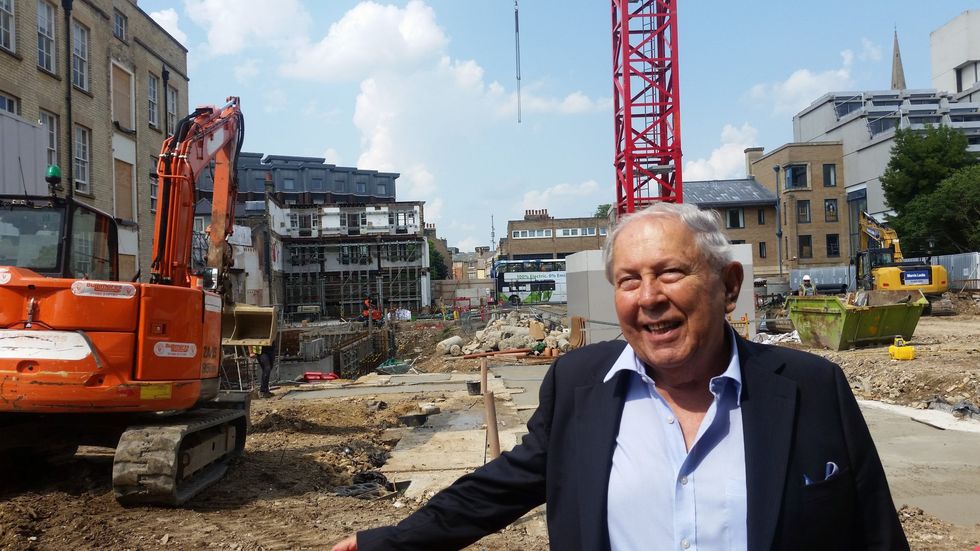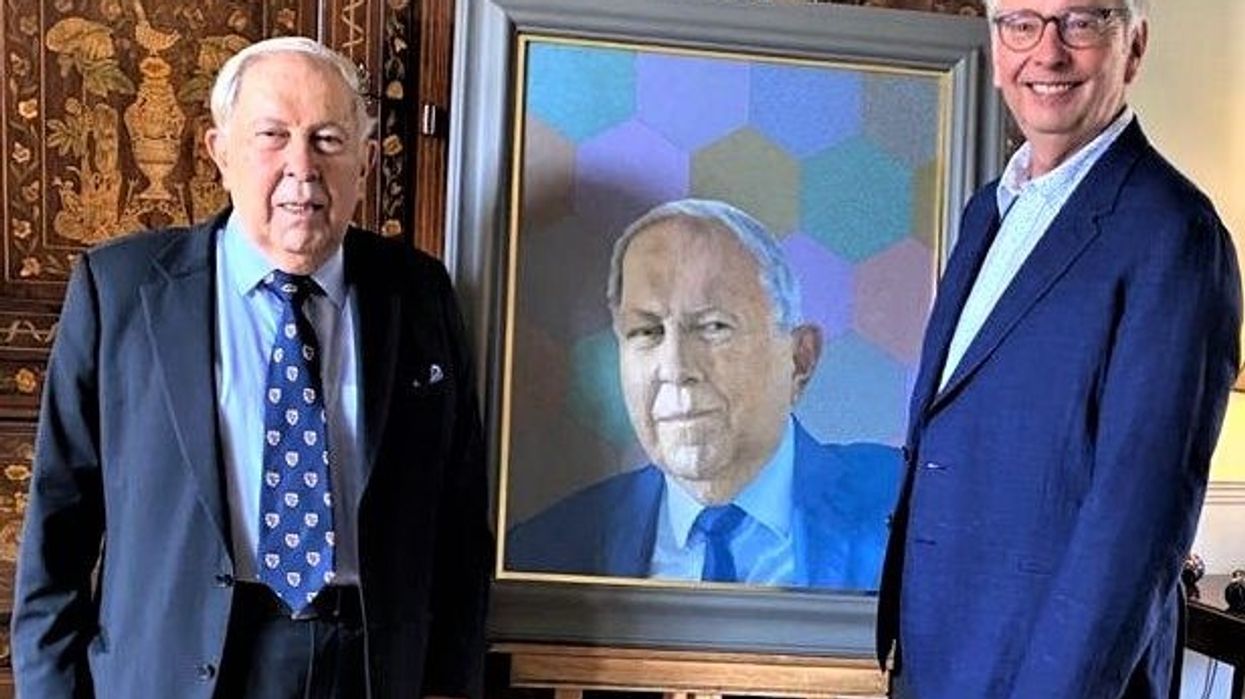Christ's honours pharma boss Yusuf for his global humanitarian work
A PORTRAIT of Yusuf Hamied, boss of the Indian pharma company, Cipla, has been unveiled at Christ’s, his old Cambridge college, in recognition of all his work as “a truly global representative of humanitarianism at its best”.
Other than Amartya Sen, who merits a portrait in the formal dining Hall of Trinity College, Cambridge, as its Master between 1998 and 2004, this is thought to be the first time that Oxbridge has honoured an Indian in such fashion.
Hamied, who is 84, did an undergraduate degree in chemistry followed by a PhD between 1954 and 1960. “I feel nostalgic every time I am in Christ’s,” said Hamied. “I feel 18 again.”
He noted that other than Sen, “I think probably I’m the only Indian in 800 years whose portrait is coming up in college. I’m very, very privileged and honoured.”
Present at the unveiling last Wednesday (21) was the vice-chancellor of Cambridge, Prof Stephen Toope. He spoke about the brilliance of Indian students down the ages, from the mathematical genius Srinivasa Ramanujan to Sen, whose just-published memoir, Home in the World, deals at length with his early years at the university.
Toope, a Canadian lawyer specialising in human rights and international relations who became vice-chancellor in October 2017, said he was determined to make the bonds with India even stronger.
He said: “Despite Covid, we continue to have very close relations with our alumni in India, as well with various partners where we have work, some through the government, some through educational institutions where we partner. We’ve been able to keep all those relationships alive, but I think moving forward, it will be much better when we can all be together again.”
Talking about the references to Cambridge in Sen’s memoir, Toope, who normally visits India three or four times a year, and is hoping to travel there in the autumn, said: “It’s an historic link, obviously. You’ve got Ramanujan, you’ve got many many historical figures of great importance who have Cambridge links. And, of course, that’s expanded. We now have more Indian students than ever in this group, and we will continue to welcome more and more people, I hope from India, over the course of the next number of years.”
Cambridge, which normally comes out top or near the top in international university rankings, appreciated the quality of students from India, Toope said. “Oh, very much. There’s no question Indian students are often extremely well prepared across a whole range of disciplines.
“Obviously, in mathematics and sciences, there’s a great tradition, but equally in the humanities and the vitality of English as a medium of expression in India plays out in the great Indian students we have in history and English.”
Hamied’s oil painting will have company in Hall from such old boys as the poet John Milton and The Origin of Species author Charles Darwin. The painting by 84-year-old British artist Tom Phillips was unveiled first in the Master’s Lodge before being moved into Hall for permanent display.
Phillips, who has painted many prominent people, including Salman Rushdie, said: “It’s not just taking a photograph and copying it, because that doesn’t work.”
With Hamied, he put hexagons in the background “which all chemists know are benzene rings as they are called. So I thought it was like an abstraction that would go with the reality and be his reality too.”
“A lot of love” went into painting Hamied’s portrait, he admitted.
Jane Stapleton, an Australian chemist turned lawyer specialising in tort and the first woman to be Master of Christ’s in over 500 years, referred to the cheap drugs Cipla provided for AIDS patients in Africa.
“The (college) governing body voted unanimously to commission this portrait to honour Yusuf as a truly global representative of humanitarianism at its best,” she said. “His actions have saved hundreds of thousands, probably millions of lives.”
Stapleton quoted from a speech Hamied had made to the European Commission in 2000, in which he had said: “Friends, I represent the Third World, I represent the needs and aspirations of the Third World, I represent the capabilities of the Third World.”
She added: “The Third World has no better representative of its aspirations and capabilities. And Christ’s College has no alumnus of whom it is more proud than Yusuf.”
After unveiling the portrait with his wife Farida, Hamied said: “One of the things I do feel is that if one is successful in life, one should help society as much as possible. And in my particular instance, I strongly believe in education, and whatever I can do for education, whether it is here, or in India, or elsewhere, I try and do.”
Guests at the unveiling included two Cambridge University chemistry professors, Sir Shankar Balasubramanian and Sir David Klenerman, who won the 2020 Millennium Technology Prize.
Two former masters of Christ’s – Alan Munro and Frank Kelly – were also present, as was the microbiologist and expert on tuberculosis, Lalita Ramakrishnan, sister of former Royal Society president, Sir Venkatraman Ramakrishnan.
Christ’s is currently putting up a new £20 million building, Hamied Court, which will house more than 60 research scholars from all over the world.

It will stand next to the Todd building, named after Lord Todd, a former Master of Christ’s and Nobel Prize winner, who was the one who admitted the young Yusuf Hamied to the college. “Two chemists together,” Stapleton said.
After inspecting the construction work, Hamied posed for a photograph with the bust of another old boy, Jagdish Chandra Bose, the eminent Indian biologist, physicist and botanist who invented radio waves ahead of Marconi.
Speaking after the unveiling, Hamied said he was saddened that the Cipla factory in South Africa, which he had put up so that it could make much-needed drugs for local consumption, had been wrecked in the recent riots.
Turning to the Covid situation in India, he said Cipla was negotiating with Moderna to get boosters jabs from 2022 – “we are talking, nothing’s finalised”.
He said: “Cipla is making the widest range of Covid drugs in India, including Favipiravir and Remdesivir. And marketing two Roche drugs Tocilizumab and REGEN-COV. All at affordable prices. A dose of Tocilizumab costs $6,000 (£4,357) in the US; we are selling for $600 (£436) in India. We are talking to Merck (a US pharma giant) about a new drug, Molnupiravir. Through the Cipla Foundation we are trying to get vaccines into underprivileged areas.”




